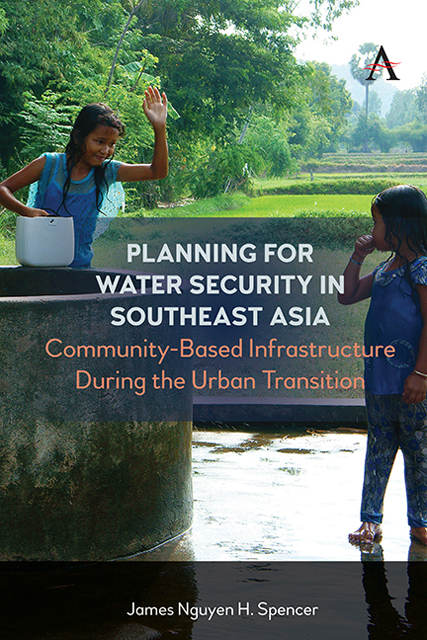 Planning for Water Security in Southeast Asia
Planning for Water Security in Southeast Asia Book contents
- Frontmatter
- Content
- Preface
- Introduction
- 1 Water and Human Security
- 2 Global Urbanization: The Confluence of Peri-Urbanization and Urban Transition
- 3 Community-Based Public Finance of Deep Well Water Systems in Peri-Urban Java
- 4 The Peri-Urbanization of Can Tho and the rise of Entrepreneurial Water Suppliers in the Mekong Delta
- 5 Ha Noi: Bulk Water Retailing in Peri-Urban Areas
- 6 Peri-Urbanization, Co-Production and Institutional Culture: The Case of the Phnom Penh Water Supply Authority
- 7 Beyond Resilience: Are we thinking about Entitlements, Participation and Governance in the Right Way?
- References
- Index
- Frontmatter
- Content
- Preface
- Introduction
- 1 Water and Human Security
- 2 Global Urbanization: The Confluence of Peri-Urbanization and Urban Transition
- 3 Community-Based Public Finance of Deep Well Water Systems in Peri-Urban Java
- 4 The Peri-Urbanization of Can Tho and the rise of Entrepreneurial Water Suppliers in the Mekong Delta
- 5 Ha Noi: Bulk Water Retailing in Peri-Urban Areas
- 6 Peri-Urbanization, Co-Production and Institutional Culture: The Case of the Phnom Penh Water Supply Authority
- 7 Beyond Resilience: Are we thinking about Entitlements, Participation and Governance in the Right Way?
- References
- Index
Summary
On paper, this book is a long time coming. It began in 2005 when I was at the University of Hawai’i at Mānoa (UHM) working on a small grant from the US Department of State to examine an issue related to clean water supplies in Southeast Asia. Of all the infrastructures that make dense urban living possible, a clean, reliable and healthy water supply is the most important because so many other aspects of a livable community depend on it. Of course, I was drawn to research this topic in Cần Thơ, Việt Nam, where I had done work before; my initial foray led me to expand the project—with support from the Ford Foundation and the US Department of Education—to conduct similar interviews and implement surveys related to local water supplies in other areas of Việt Nam, as well as in Cambodia and Indonesia. The papers resulting from that empirical work have been through many iterations before coming to you in the form of this book. My thanks go out to the Anthem Press editorial staff, as well as two blind reviewers who helped me consolidate these case studies into a larger argument. While their input has been invaluable to me in shaping this broader case, any shortcomings are mine alone.
In my heart, this book has been much longer in its genesis. My interest in Việt Nam and other areas of Southeast Asia are part of my DNA, given that my mother, Nguyễn Xuân Đào Spencer, hails from Sa Đéc, a town in Việt Nam's Mekong Delta about 50 km north of Cần Thơ. It was during the early 1990s that I began to shape the overall perspective that I articulate in this book: that to understand and navigate the world, we need to look beyond formal declarations and systems to focus on how people behave. There are many ways in which the description of informal groups getting the important work of governance done can be traced back to the experience of being my mother's son. Having been denied in graduate education and in diplomacy, she forged her own independent and less formal professional pathway. This pathway must have been in her mind when she warned me off from law school as being too detail-oriented.
- Type
- Chapter
- Information
- Planning for Water Security in Southeast AsiaCommunity-Based Infrastructure During the Urban Transition, pp. vii - xiiPublisher: Anthem PressPrint publication year: 2022
